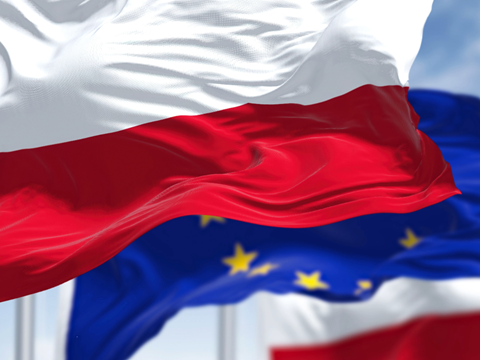
As Poland’s Ministry of Environment plans to introduce a fully state-controlled model for extended producer responsibility, packaging industry players like EUROPEN, Cepi, Flexible Packaging Europe, and Pro Carton argue that it could undermine the Waste Framework Directive and Packaging and Packaging Waste Regulation.
The drafted Act on Packaging and Packaging Waste is set to enforce the ‘polluter pays’ principle nationwide. The system will be centrally managed by the National Fund for Environmental Protection and Water Management (NFOŚiGW) and will charge Polish businesses a fee for all packaging placed on the market; the exact price will modulate depending on the type and weight of packaging in question.
The fee will start at 8% of the product fee rate in 2026, rise to 20% in 2027, and theoretically even out in 2028. The accumulated funds will go towards the collection, processing, and recycling of waste by municipalities and waste management organizations.
In general, the draft bill aims to hold businesses financially responsible for the packaging waste they generate, incentivizing them to streamline the quantity and weight of their output. In turn, it hopes to reduce the burden on municipal services and budgets to handle vast amounts of waste.
However, the solution has proven controversial. In a joint industry contribution, signatories express their concern that the Act on Packaging and Packaging Waste could derail the implementation of the EU’s Waste Framework Directive (WFD) and Packaging and Packaging Waste Regulation (PPWR).
Apparently, a state-run model risks increasing the administrative burden for operators, driving up administrative costs, and interfering with transparency. It could also stall progress towards recyclability at scale as per Article 6 of the PPWR, critics say.
This has raised concerns that numerous packaging applications could lose market access by 2035, whether they meet the PPWR’s Design for Recycling requirements or not – an outcome thought to impact both businesses and consumers.
Regarding the fee rate, the signatories say it is ‘unclear’ why the specific percentages ‘are based on a penalty applied to recovery organizations when they fail to meet the recycling targets’. They expect the fees collected to exceed the real management costs, which violates the WFD.
Fears have arisen that the accumulated fees could be directed towards the general state budget instead of waste management processes, which would undermine the Waste Framework Directive. Furthermore, the statement argues that reaching the exact fee rate in 2028 creates business uncertainty in the meantime, and goes against the eco-modulation principle that will apply across the continent at the same time – this one modulating fees based on packaging recyclability.
As such, the organizations ‘urge Polish authorities to reconsider their proposal and establish an EPR system fully aligned with the general minimum requirements of the WFD and supportive of the recyclability at scale objectives of the PPWR’, as well as ‘ensure full consistency with the PPWR text and avoid any regulatory divergence.’
“The proposed system is designed as a taxation model rather than as an effective EPR system,” the statement reads. “It would result in heavy administrative and financial costs for all the operators involved while failing to deliver the EU circular economy goals.
“Poland’s system should instead be designed to concretely contribute to the objectives of the Packaging and Packaging Waste Regulation (PPWR). “
Other signatories include the European Paper Packaging Alliance (EPPA), the European Carton Makers Association (ECMA), Aluminium Closures Group, Steel for Packaging Europe (SfPE), UNESDA – Soft Drinks Europe, The European Container Glass Federation (FEVE), and the European Aluminium Foil Association (EAFA).
Petcore Europe, The European Federation of Corrugated Board Manufacturers (FEFCO), Metal Packaging Europe, the Federation of European Producers of Envelopes and Light Packaging (FEPE), Elipso, and Natural Mineral Waters Europe (NMWE) also signed.
Additionally, IK - Industrievereinigung Kunststoffverpackungen, FBCA – The Food & Beverage Carton Alliance (FBCA), EKO-PAK – Packaging Industry Union of Employers, Der Grüne Punkt, CICPEN – Czech Industrial Coalition for Packaging and the Environment, and the Association of Greek Manufacturers of Packaging & Materials are listed.
State-run producer responsibility organizations have come under fire before. Last year, a joint industry statement critiqued their inclusion in the Packaging and Packaging Waste Regulation, since they were accused of opening legal loopholes and threatening the EU’s recycling targets and decarbonization goals.
Since then, over fifty packaging associations have co-signed a joint industry statement warning that state-run producer responsibility organizations risk lowering recycling rates, increasing administrative costs, and impacting both product availability and transparency.
If you liked this story, you might also enjoy:
The ultimate guide to the Packaging and Packaging Waste Regulation in 2025
How are the top brands progressing on packaging sustainability?
Everything you need to know about global packaging sustainability regulation in 2025
The key to increasing the use of reusable packaging in supermarkets














No comments yet